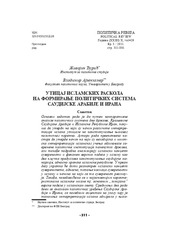Prikaz osnovnih podataka o dokumentu
Uticaj islamskih raskola na formiranje političkih sistema Saudijske Arabije i Irana
| dc.creator | Đurić, Živojin | |
| dc.creator | Ajzenhamer, Vladimir | |
| dc.date.accessioned | 2020-01-08T16:47:12Z | |
| dc.date.available | 2020-01-08T16:47:12Z | |
| dc.date.issued | 2011 | |
| dc.identifier.uri | https://rhinosec.fb.bg.ac.rs/handle/123456789/126 | |
| dc.description.abstract | Different variations of Islam, Shia and Wahabi, played a key role in shaping the political systems of Saudi Arabia and Iran. On the example of Saudi Arabia we may see that the institutions of this authoritarian system w?re established under the crucial influence of Wahhabism. By adopting the Wahhabism as the royal family ideology, Al Saud’s absolute monarchy was strengthened with religious legitimacy. Today, Wahhabism remains the major determinant of the political processes in Saudi monarchy. That can be seen best through the powers given to the clerical circles in various areas of social life, and also by the fact that the state legal system is based exclusively on the fundamentalist interpretation of Islamic religious law. On the other hand, Islamic Republic of Iran owes its current political system to centuries long tradition of Shia imamate, which, along with a brief but strong tradition of parliamentary government, formed the precondition for a unique and highly complex political system. Uniqueness and complexity of the Iranian political system is a direct consequence of inability to achieve the highest religious imperative, the rule of Mahdi (righteous messiah), which led to the creation of “The Next Best Thing” alternative - the Islamic republic as Velayat- e faqih. It is important to notice the qualitatively different manner in which Islam has been incorporated into these political systems. Although considered to be a fundamentalist Islamic order, in which sharia law is most consistently respected and implemented, Saudi Arabia, however, is a monarchy in which the absolute power is still in the hands of secular ruler. Right to pass legislation in the form of royal decrees confirmes that, regardless of his religious title, the government of Saudi king is essentially secular. Therefore Wahhabism, although it’s undoubtedly the foundation of the Saudi state, in political life of the kingdom serves primarily as a pillar of the monarchy. Islamic Republic of Iran, based on the values of the Islamic Revolution, links its political dynamics to the institutionalization of clerical positions in government structures (Fagih, the Guardian Council, the Council of Experts), and therefore we can conclude that synthesis of Shia Islam and the politics in Iran is fully achieved. | en |
| dc.rights | openAccess | |
| dc.source | Politička revija | |
| dc.title | Uticaj islamskih raskola na formiranje političkih sistema Saudijske Arabije i Irana | sr |
| dc.type | article | |
| dc.rights.license | ARR | |
| dcterms.abstract | Ђурић, Живојин; Aјзенхамер, Владимир; Утицај исламских раскола на формирање политичких система Саудијске Aрабије и Ирана; Утицај исламских раскола на формирање политичких система Саудијске Aрабије и Ирана; | |
| dc.identifier.fulltext | https://rhinosec.fb.bg.ac.rs/bitstream/id/23/123.pdf | |
| dc.type.version | publishedVersion |

